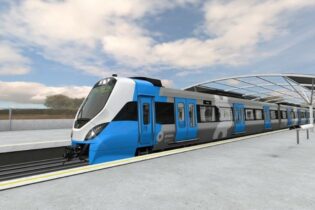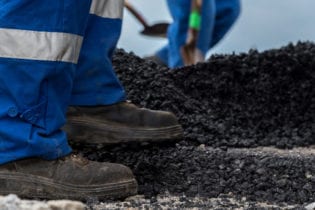Celebrating 50 years of ‘doing good while doing business’, the Bigen Group is renowned for providing cost-effective infrastructure and socio-economic development solutions across Africa.
In celebration of Youth Month, IMIESA speaks to upcoming engineering and project management professional David Gopane, a senior engineer within the Group’s RealEstate Directorate. What attracted you as a young engineering professional to the Bigen Group of companies? DG Being a typical millennial, I look for meaningfulness in my career and Bigen’s purpose of ‘doing good while doing business’ powerfully resonates with my way of thinking. Since its inception 50 years ago in 1971, the Group has managed to transform itself from a traditional engineering firm into an engineering firm with a conscience and, ultimately, an infrastructure development company committed to socio-economic well-being wherever we work. Seeing the life-changing effects of the infrastructure we provide – not only in terms of providing impoverished communities access to basic services such as health, education, water and housing, but also the many jobs we create through our infrastructure projects – provides me with meaning and value for the role I play in this organisation. This is what attracted me to Bigen in the first place, and this is what has inspired me to stay with the Group for the past
nine years. In the Real Estate Directorate alone, we have delivered more than 320 000 housing opportunities across the continent and we have also been involved with more than 42 000 school projects in South Africa. How has the business evolved over the past 50 years? Our beginnings were humble. It started with the establishment of a small engineering consultancy in Polokwane, South Africa, in 1971. Over the past 50 years, we have grown and transformed from a traditional engineering consultancy operating from one office in Polokwane, to an engineering firm operating from eight regional offices in South Africa, and now to a truly African infrastructure development group of companies with headquarters based in Mauritius and South Africa, and country offices in Botswana, Ghana, Kenya, Mozambique, Namibia, Tanzania and Zambia. During the past five decades, Bigen has kept pace with the fast-growing infrastructure development needs of the continent and transformed itself into one of Africa’s leading engineering, advisory and infrastructure development company groups, working in Africa, for the people of Africa. As the recipient of many prestigious industry awards, Bigen’s commitment to efficiency, transformation, development impact and quality is well acknowledged. Bigen has become a partner of choice for African governments seeking bespoke, cost-effective infrastructure development solutions, and has transformed lives and economies in 19 countries. What are the burning issues within the infrastructure development sector right now? Inadequate infrastructure is the single biggest threat to Africa’s long-term growth; in South Africa, the effective implementation of infrastructure development has always been plagued with subdued economic growth, a lack of funding, corruption, and capacity issues. To my mind, however, the burning issue within the South African infrastructure sector right now is, without a doubt, the outbreak of Covid-19 and its related lockdowns. The infrastructure and construction sectors have been severely impacted and, according to Stats SA, the construction industry – which is a major provider of jobs in South Africa – experienced its eighth consecutive quarter of economic decline, slumping further by 76.6%. Having been classified as an ‘essential service’ during the lockdown, Bigen was, fortunately, able to continue providing services in most sectors, with its teams being issued with travel permits. To me, as a young professional, it was really reassuring to see how the company I worked for continued to provide water to communities, enabling them to adhere to the national directive of hand-washing to prevent further spread of the virus. The upgrading of healthcare facilities and the erection of temporary ones to accommodate Covid-19 patients were other important projects Bigen has undertaken for, inter alia, its Department of Health clients. As a senior engineer for the Group, I also felt assured by the various measures Bigen had put in place to safeguard its employees and clients and to ensure construction sites were safe according to the national health directives. What can be done to address these issues?
In a bid to counter the devastating effects of Covid-19 on the economy, the Economic Reconstruction and Recovery Plan was announced by President Ramaphosa on 15 October 2020. The plan’s priorities include attracting investments, a massive infrastructure programme, an employment stimulus to create and support jobs, steps to achieve energy security, and measures to intensify local industrialisation and African integration.
I believe that companies in South Africa have a huge role to play to support the government in its quest to regain economic stability in the aftermath of the Covid-19 pandemic. Governments and the World Health Organization alone cannot defeat this pandemic and its related devastating effects on the economy and infrastructure development. Private sector companies now have an increasingly important role to play in support of responsible capitalism, which seeks to move corporate culture beyond mere profits and shareholder gains. At Bigen, we have managed to achieve a fine balance between the concepts of profitability and beneficiation, and we have successfully been supporting governments in Africa to achieve their Sustainable Development Goals by 2030. What role can South African engineers play in supporting government’s economic turnaround strategy? Engineers have helped to build South Africa, in the physical sense, and they will help to rebuild the economy. PwC states that science, technology, engineering, arts and mathematics (STEAM) jobs will stay in demand to drive productivity gains; as engineers, we should aim to use our skills to support economic recovery and pivot towards a brighter future. During the Covid-19 pandemic, engineers have played a critical role, both on the frontline and in supporting frontline workers and communities across South Africa. Engineers are essential in the design, implementation, construction supervision and maintenance of all types of infrastructure – making the engineering profession critical in connecting communities, driving our economy, and keeping South Africans safe. Government’s willingness to coordinate and collaborate with key stakeholders, particularly the engineering profession, is essential as South Africa continues to cope with a response to the current pandemic, while shifting its focus towards the country’s economic recovery. What are some of the key projects that Bigen is busy with right now? Bigen is continuing its involvement in projects and operations supporting the economic recovery of South Africa, as well as other African countries. Bigen is already involved, by way of engagement on specific projects, in the South African Strategic Integrated Projects (SIPs) programme of the Department of Public Works and Infrastructure, under the Presidential Infrastructure Coordinating Commission Council. At the end of July 2020, 62 SIPs were gazetted, six of which involve Bigen: • Phase 2A of the Mokolo Crocodile River (West) Augmentation Project, Limpopo • Rehabilitation of the Vaalharts-Taung Irrigation Scheme, Northern Cape and North West • Berg River Voëlvlei Augmentation Scheme, Western Cape • Phase 2 of the Lesotho Highlands Water Project, Gauteng • Lufhereng Housing Development, Gauteng • Vista Park 2 and 3, Free State. All of these will make a lasting socio-economic difference to the lives and livelihoods of affected communities.






